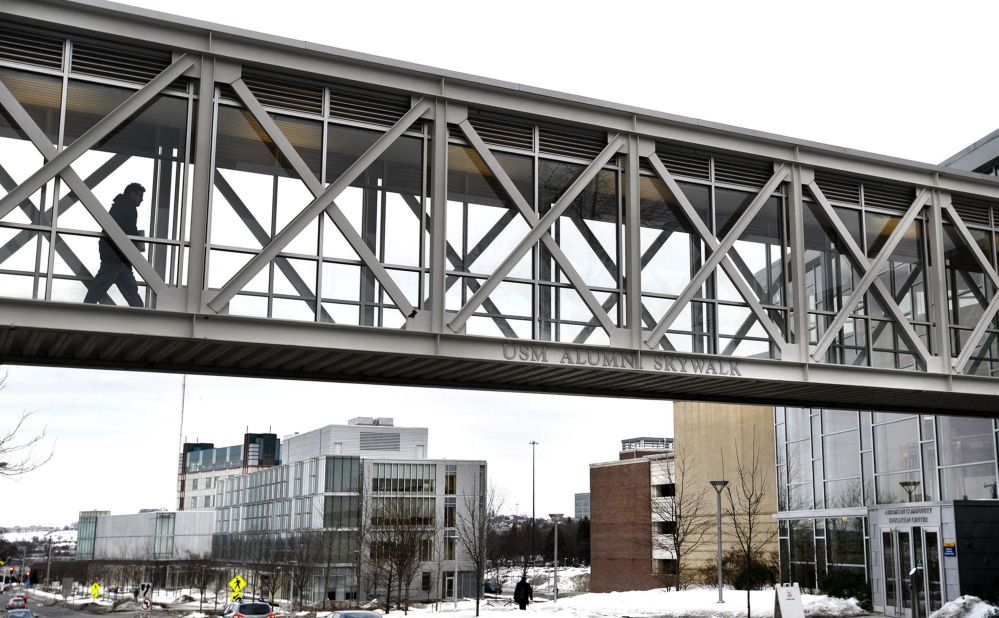Two-time gubernatorial candidate Eliot Cutler is being hired by the University of Maine System to oversee the establishment of a new graduate business and law school in Portland.
The university system plans to announce next week that Cutler has been chosen to create what’s being called the Alfond Professional and Graduate Center, according to several people who have been briefed on the appointment.
The center would operate in Portland and combine the graduate business programs at the University of Southern Maine in Portland and the University of Maine in Orono, and the University of Maine School of Law, which is on USM’s Portland campus. Further details are unknown at this time, including whether the Muskie School of Public Service, also located at USM, would be included in the new center.
Cutler, a Cape Elizabeth resident, ran for governor as an independent in 2010 and 2014. His best showing was in 2010, when he narrowly lost to Gov. Paul LePage. In 2014, Cutler placed a distant third with only 8 percent of the vote.
Cutler was out of the country Tuesday and could not be reached. University officials and others contacted to confirm Cutler’s appointment were not authorized to speak publicly.
Dan Demeritt, spokesman for the University of Maine System, would not confirm the news. He said the process of combining the business and law school programs, which began last year, is nearing its end. However, he said no contract has been signed with anyone to lead the establishment of the new center.
Cutler, 68, is a Bangor native with a distinguished career in government and the law. He graduated from Harvard College and later earned a law degree from Georgetown University.
After graduating from Harvard, Cutler worked in Washington, D.C., for U.S. Sen. Edmund Muskie, the powerful Democratic senator from Maine. He went on to become associate director of the Office of Management and Budget under President Jimmy Carter.
Cutler has extensive experience in the private sector, as well. He founded his own environmental law firm, Cutler & Stanfield, in the late 1980s, which he eventually sold to an international firm, Akin Gump. More recently, Cutler spent many years opening international law offices for Akin Gump in China before returning to Maine to live full time. He sits on the Board of Visitors of the Muskie School.
A NEW ‘TRANSFORMATIVE’ DIRECTION
In fall 2013, system Chancellor James Page began to formulate the idea of a combined professional and graduate center that would serve as a “home for entrepreneurial, multi-disciplinary business and legal programs to drive economic development statewide,” he wrote in a November 2014 memo to the university system’s board of trustees.
With $500,000 from the Harold Alfond Foundation, the system commissioned a report from the The Parthenon Group, a Boston-based consultancy, to explore the concept of such a school and its market viability. That report, presented to system officials in late 2014, found that such a center “is indeed a transformative concept” for the system, Page wrote in the memo.
“Based on the business/legal community’s enthusiastic endorsement of the core concept, bringing graduate business and legal education under one roof could catalyze the growth of small to medium businesses across Maine,” Page wrote.
Members of the system’s business schools have previously voiced concern about the proposal.
At a USM Faculty Senate meeting in May 2014, Bob Heiser, an assistant professor of marketing at USM’s business school, said the planning to date had been too secretive and the faculty had insufficient input in the process, with “no direct contact with the (Parthenon) consultants and no written updates whatsoever.”
Reached Tuesday, Heiser said he had heard nothing for months about the proposal to combine the business programs. He expressed frustration that secrecy over the plan has persisted.
Robert Strong, a professor of finance at the business school in Orono, was on the original committee that worked with consultants from The Parthenon Group and helped develop the concept for the center.
That working group hasn’t met in months, and Strong said Tuesday that he had no knowledge of Cutler being chosen to establish the new combined graduate school.
ACCREDITATION, MODERN FACILITIES
Strong likes the concept of combining the business programs, but said many people involved have legitimate worries about the organizational details, including how Orono-based professors would teach in a Portland-based center and whether a degree from the graduate center would be considered a system degree or be affiliated with USM or Orono. Strong also said people worry that those in charge are underestimating how hard it would be for the new center to receive accreditation.
“In principle, the idea has some merit,” Strong said. “We just want to make sure we figure out all the ins and outs and make sure the program will pass muster with the accreditation agencies.”
The number of MBA graduates coming out of the individual business schools in Portland and Orono has varied widely in recent years. On a systemwide basis, it ranges from 60 to 80 annually. During the 2012-13 school year, Orono had 19 MBA graduates, down from 32 in 2011-12. USM had 41 graduates during the 2012-13 school year, up from 33 in 2011-12.
The law school – which already has joint degree programs with the business schools and the Muskie School – has long sought better facilities. Outgoing law school Dean Peter Pitegoff has said the current building, a distinct round structure built in 1972 on USM’s Portland campus, lacks adequate lounge, study and classroom space and access to technology that students expect. A new facility could offer up-to-date technology and have adequate space for classrooms, public events and work with clients.
Staff Writer Noel Gallagher contributed to this report.
This story was updated at 11:36 on Friday, March 27, 2015 to correct information about the availability of The Parthenon Group report. The report has been made available to the public.
Send questions/comments to the editors.



